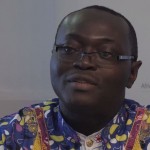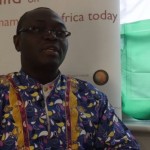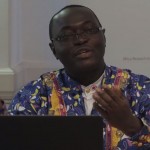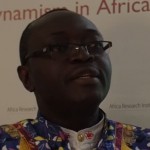At the launch of ARI’s new publication, “Modern African Remedies” on Thursday 23 April 2015, Father Anselm Adodo, the founder of Paxherbals, Nigeria’s foremost herbal medicine manufacturer, spoke passionately about how indigenous knowledge has been employed in Edo State to transform a community; and how herbal medicines can be a force for innovation and improvement in health care, in Nigeria and globally.
Interview with Anselm:
In 1996, Father Anselm Adodo established “Pax” at the Benedictine monastery in Ewu, Edo State to address what he saw as the consequences of an ever-increasing fixation with technological advances at the expense of nature. The initiative was conceived as an effort to reconnect with the natural environment through herbal medicine, in partnership with the local community.
Anselm recognised that a vast amount of valuable indigenous medicinal knowledge was being lost and sought to work with traditional healers to preserve what remained. Pax has gradually been able to convince healers to share their knowledge by establishing a relationship founded on trust and mutual respect. A common aim is to modernise and professionalise traditional medical practice, making it transparent and evidence-based.
The application of science and innovation in herbal medicine is important, but Anselm has also tried to replace outmoded views of science as something exemplified by men and women in white coats. The old farmer in a village in Kenya is a scientist: he knows about soil fertility and how much water a seed needs to grow. The purpose of science is the validation or rejection of a hypothesis. In this context, Pax has used indigenous knowledge as the hypothesis and science as the means of investigating the medicinal properties of plants, herbs and other natural resources.
Anselm does not talk about traditional medicine because traditional can imply rigidity, stasis and being stuck in the past. Perceptions are very important, not just in Nigeria but globally. He prefers the term “African medicine”, connoting something modern, innovative, uniquely African and, when done in partnership with the community, transformative.
From its origins in a small wooden hut Pax has grown to the extent that it now employs almost 150 staff. Today it has a large factory, modern research laboratories, a herbarium and three clinics. Raw materials are grown on communal farms. Perseverance, professionalism and stringent quality control have finally attracted attention from the government. By working alongside regulatory bodies and following their guidelines to ensure products meet required standards, Pax has become a respected name in a sector associated by some with charlatans and quackery. Pax is now advising regulators and health authorities on the evolution of the herbal medicine sector in Nigeria and the merits of partnership with orthodox medical care.
Pax’s success is based on an open and transparent partnership with the local community in Ewu – its suppliers and employees. Anselm is insistent that the Pax model of combining community, nature and science is a good one for the sustainable development of rural communities throughout Nigeria.
For Anselm, Pax is more than just a manufacturing or agricultural enterprise. It is a contribution to the necessary process of altering a common narrative of Africa being a continent asking for help to one in which Africa must – and can – help itself.
Questions
Q. What have you done to test the efficacy of your products? – Yemisi Bokinni, UK medical doctor
A. Clinical trials are expensive. In Nigeria, they have to be done in collaboration with government. Pax is keen to do this. Claims about the efficacy of our products are meticulously documented but not yet validated by clinical trials. However, 33 Pax products are certified by NAFDAC as safe to consume and we hope to increase this to 41 by the end of 2015. No other Nigerian firm has more than three products certified.
I encourage medical doctors and scientists to partner with Pax in carrying out research. At present most of our own research focuses on quality control, but we are open to partnerships to test efficacy.
Q. How do you separate the herbal practitioners who are doing it right from those who are simply quacks? – Professor Folayan Esan, Ekiti State University
A. More open dialogue could be the way forward. In this respect, Pax aims to be a bridge between academics, regulatory bodies and communities. I am a firm believer that once channels of communication are opened, significant progress will be made.
Q. Do you have links with China in product or policy development? Would you be interested in collaboration? – Maddalena Procopio, PhD Student at LSE
A. We have had several invitations to visit Chinese companies but my response has always been the same: come to Nigeria, then we can talk and see if we can work together. That must be the starting point – not just for Pax, but for Africa.
Video of Anselm’s talk:
Photos:
Audio podcast:
[audiomack src=”https://www.audiomack.com/song/africaresearch/modern-african-remedies-event-podcast”]












